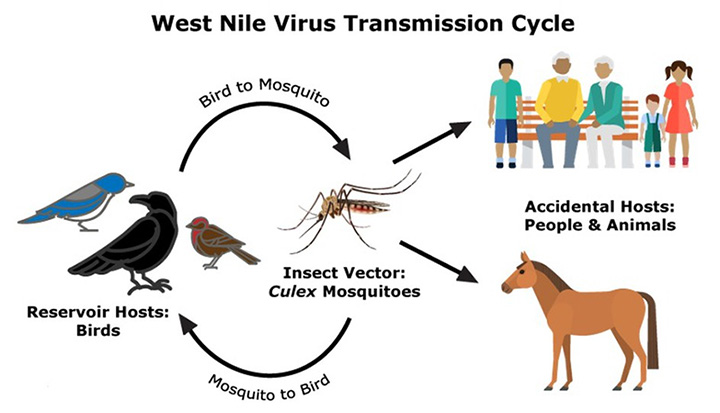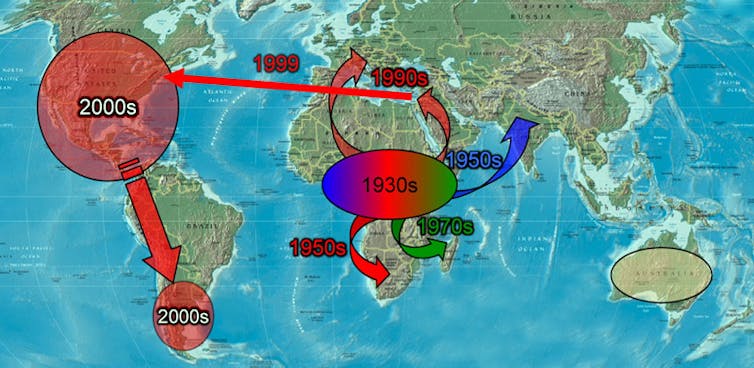Table of contents
Why in the News?
The Kerala health department is on alert after the death of a 47-year-old from Thrissur due to the West Nile Virus.

- Earlier in 2019, a six-year-old boy in Malappuram district had died of the same infection.
- The virus was first reported in the state, in Alappuzha in 2006 and then in Ernakulam in 2011.
What is the West Nile Virus?
- The West Nile Virus is a mosquito-borne, single-stranded RNA virus.
- It is a flavivirus related to the viruses that cause St. Louis encephalitis, Japanese encephalitis, and yellow fever.
How does it spread?
- Culex species of mosquitoes act as the principal vectors for transmission.
- It is transmitted by infected mosquitoes between and among humans and animals, including birds, which are the reservoir host of the virus.


- WNV can also spread through:
- Blood transfusion
- From an infected mother to her child
- Exposure to the virus in laboratories.
- It is not known to spread by contact with infected humans or animals.
- To date, no human-to-human transmission of WNV through casual contact has been documented.
Incubation Period
The incubation period, according to CDC, for WNV disease is
- Typically 2 to 6 days
- But can range from 2 to 14 days.
- It can be for several weeks in immunocompromised people.
Symptoms
- Asymptomatic in 80% of the infected people.
- The rest of the 20% develop West Nile fever or severe West Nile disease.
- The symptoms include fever, headache, fatigue, body aches, nausea, rash, and swollen glands.
- Severe infection can lead to neuroinvasive diseases such as:
- West Nile encephalitis
- Meningitis
- West Nile poliomyelitis
- Acute flaccid paralysis
- WNV-associated Guillain-Barré syndrome
- Radiculopathy
Note: It usually turns fatal in persons with co-morbidities and immuno-compromised persons (such as transplant patients).
Treatment
No WNV-specific Vaccine, prophylaxis or treatment is available.
- Only supportive treatments are given to neuroinvasive WNV patients.
- Health authorities globally advise for personal protective measures to reduce the risk of mosquito bites.

Spread of West Nile Virus

According to the WHO, human infections attributable to WNV have been reported in many countries in the world for over 50 years.
- The virus was first isolated in a woman in the West Nile district of Uganda in 1937.
- In 1997, a more virulent strain caused the death of different bird species in Israel, presenting signs of encephalitis and paralysis.
- In 1999, a WMV strain reached New York, producing a large outbreak that spread across the Americas, from Canada to Venezuela.
WNV outbreak sites are found along major bird migratory routes.
Today, the virus is found commonly in Africa, Europe, the Middle East, North America, and West Asia.
What are the Preventive measures?
In most countries, the peak for WNV infections generally coincides with the period when mosquito vectors are most active, and the ambient temperature is sufficiently high for virus multiplication.
- Public health departments to ensure larval source reduction especially at breeding and resting sites for the mosquito vectors.
- Active Animal Health Surveillance System
- Since WNV outbreaks in animals precede human cases, an active animal health surveillance system is essential
- To detect new cases in birds and horses.
- And provide early warnings to veterinary and human public health authorities.
- Since WNV outbreaks in animals precede human cases, an active animal health surveillance system is essential
- Prevent blood transfusion-transmitted WNV infections during the active virus transmission period.
- It is advised to implement a 28-day blood donor deferral or nucleic acid testing of prospective donors who have visited or lived in an affected area.
- Donors of organs, tissues and cells living in or returning from an affected area should be tested for WNV infection.

There are several steps you can take to reduce your risk of getting bitten by an infected mosquito:
- Minimize mosquito exposure:
- Use insect repellent with DEET, picaridin, IR3535, oil of lemon eucalyptus (OLE), para-menthane-diol (PMD), or 2-undecanone when outdoors, especially during dawn, dusk, and evening.
- Wear long-sleeved shirts and long pants when possible, especially if you're outdoors during peak mosquito times.
- Eliminate mosquito breeding grounds around your home by removing standing water sources like gutters, birdbaths, and old tyres.
- Travel precautions:
- If travelling to an area with a high risk of WNV, be extra vigilant about mosquito bite prevention.
By following these preventive measures, you can significantly reduce your chances of getting West Nile Virus.

Source: The Hindu, The Indian Express
Previous Post